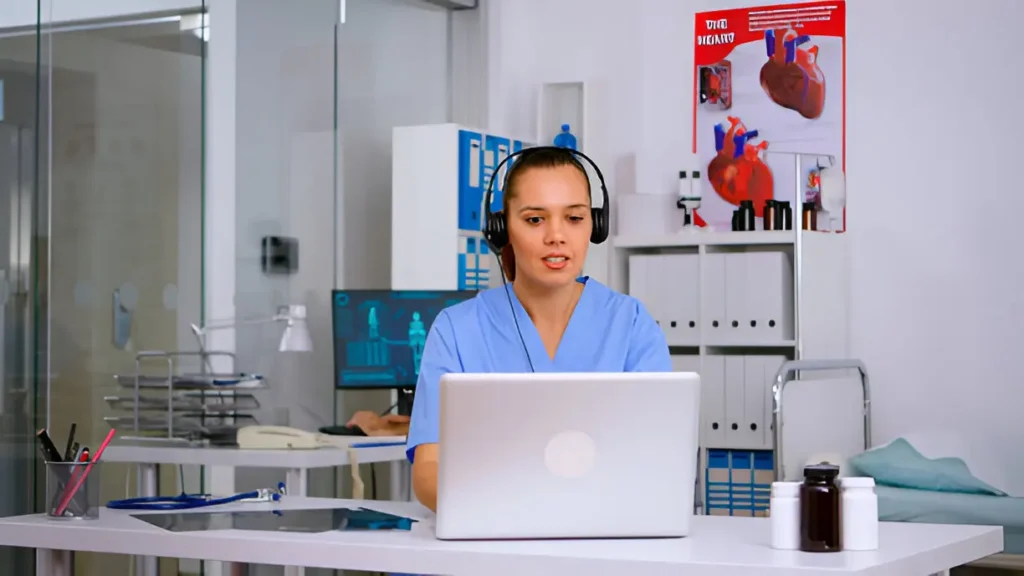With the rise in healthcare needs, how the U.S. delivers care is changing due to the increase in administrative stress. Virtual Assistants are transforming care delivery from private clinics to large hospitals and even telehealth services. These AI-based tools are more than just appointment scheduling robots—they are key in enhancing the patient experience, improving staff productivity, and optimizing care processes and telehealth services on the whole.
What are Virtual Assistants in Healthcare?
Virtual Assistants for Healthcare Industry can be AI-driven technologies as well as human remote employees who assist healthcare practitioners by providing services like scheduling appointments, communicating with patients, and billing. They could be voice-activated AI systems or remote medically trained virtual staff working with software systems like EHRs (Electronic Health Records). These Assistants are changing the way nelical facilities work by automating processes, whether as add-ons to existing systems or stand-alone gadgets.
Boosting Productivity in Private Clinics Using VAs
Improving Front Desk Workflow
Like many businesses, private clinics face challenges such as understaffing, overwhelming workloads, and time shortages. Virtual assistants can:
– Help patients book, cancel, and adjust appointments
– Respond to basic patient questions
– Dispatch automated messages to remind patients of appointments and encourage them to engage with follow-up treatments
This automation enables front-desk employees to engage patients and perform in-person interactions with clinic patients.
Improving Communication With Patients
With virtual assistants, clinics can maintain consistent communication with patients through SMS, emails, and voice calls. Virtual assistants can send out pre-visit instructions, care reminders, and annual check-up alerts, which improves patient retention and patient satisfaction.
Addressing Queries About Billing and Insurance
Virtual assistants can:
– Dispatch invoices
– Respond to basic insurance questions
– Monitor and follow-up on overdue payments
This reduces the load on the administrative staff and improves the clinic’s billing system accuracy while increasing revenue.
Virtual Assistants Offer Support That Hospitals Need
Addressing Queries and Managing Patient Flow
With large-scale operations, hospitals have to manage vast volumes of patients. Virtual assistants can help filter through non-urgent calls, streamline the prioritization of messages, and guide patients to the appropriate departments. This improves patient routing and reduces wait times.
Helping Medical Staff
Voice-recognizing AI assistants are helpful for doctors and nurses as they:
– Access patient records hands-free
– Transcribe notes
– Retrieve lab results
– Access patient records instantly
This voice-recognition technology saves precious time and time and improves documentation accuracy, thereby improving focus on patient care.
Helping Mental Health Departments
Hospitals that offer mental health services are able to have VAs perform wellness check-in routines, monitor mood diaries, and notify teams in case action is needed. This allows mental health care to be proactive and data-informed.
Telehealth Platforms: Ideal Cases for Virtual Assistants
Effortless Appointment Management
With virtual assistants, telehealth providers are able to efficiently schedule patients, notify them about their virtual appointments, and even send them links and instructions autonomously.
Virtual Pre-Consultation
Prior to a virtual visit, AI-based VAs are able to perform automated patients’ symptoms check or obtain a brief patient history to aid the provider in decision-making. This will lead to shorter session times and increase accuracy in diagnosis.
Available Round the Clock
With virtual assistants, telehealth services will no longer be limited to a certain time. As patients from different time zones or those who need urgent assistance in the middle of the night, telehealth services will be accessible after hours.
Overall Benefits of Automation
Cost Efficiency
The use of virtual assistants is more economically beneficial compared to hiring more lower-level administrative employees. Clinics and hospitals can scale their support without a major increase to operational costs.
Error Reduction
Automated functions such as scheduling, reminders, and fills reduce human errors such as dual bookings, missed calls, and data entry inaccuracy.
Improved Patient Experience
Today’s healthcare consumers expect services that are brisk, quick, and demand very little from their side. Trust and satisfaction are crucial, and virtual assistants bolster both of them by offering a modern, tech-forward experience.
HIPAA Compliance and Security
Leading virtual assistants guarantee compliance with HIPAA regulations, utilizing secure messaging and data encryption which safeguards sensitive information to breach hard protected patient information.
Applications, Use Cases and Success Stories
Cleveland Clinic virtual assistants automate the appointment booking and reminder system which reduces no-shows.
Mayo Clinic added an AI voice assistant that enables clinicians to query medical data during surgeries and procedures.
Telehealth giant Amwell added chatbots to do first contact with clients to reduce the need to human triage.
These are all examples of both tech and non-tech institutions using virtual assistants to improve processes and outcomes.
Selecting a Virtual Assistant for Your Practice
When selecting a virtual assistant, healthcare professionals need to examine:
Customization Options: Is the virtual assistant adjustable to your particular workflow?
Integration Capabilities: Is it capable of interfacing with your EHR and billing systems?
User Experience: Is it easy to use for both staff and patients?
Support and Training: What ongoing support, onboarding, and training is provided by the vendor?
Conclusion: Welcoming the New Era of Care
The adoption of virtual assistants for healthcare professionals including private practices, large hospitals, and telehealth services is more than a trend. It offers great potential for removing operational inefficiencies, decreasing burnout, and improving patient care. Virtual assistants will form a fundamental component of the healthcare system in the U.S. as AI and digital health technologies continue to advance.
Also Read-Practical Ways to Reduce Stress in Today’s High-Speed Life


